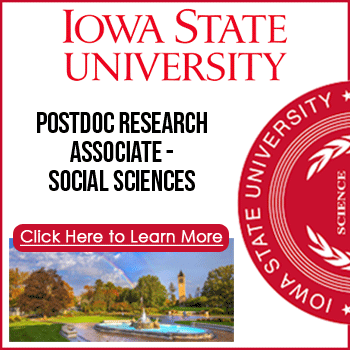Academic Recruitment Begins Here.
This job has Expired

Post-Doctoral Associate
Job Description
Full job description
Education:
- Ph.D., DDS, DVM, JD, MD or equivalent is required.
Knowledge, Skills and Attitudes:
- Advanced analytical skills and proficiency in SAS, Stata, or R programming to analyze multilevel and longitudinal data
- Intermediate GIS analytic skills – a plus
- Familiarity with obtaining U.S. Census and other administrative data
- Demonstrated commitment to investigating social determinants of racial/ethnic inequities in health
- Excellent data management skills
- Strong analytical and problem-solving skills
- Well-developed research skills including ability to execute searches using relevant search terms and synthesize data from multiple source
- Ability to set and meet deadlines
The School of Public Health (SPH) is committed to antiracism and anti-oppression and welcomes you to join us in our pursuit of building equity and driving justice. We particularly encourage applications from those who belong to groups that have been historically underrepresented in our School, including those who are American Indian, Black, Indigenous, and people of color, those with disabilities, veterans, and those from LGBTQIA+ communities.
The Post-Doctoral Associate will be supervised by Dr. Zinzi Bailey, Associate Professor in the Division of Epidemiology and Community Health. The Post-Doctoral Associate should have a doctoral degree in Epidemiology, Biostatistics, Health Services Research, Medical Sociology, or related quantitative field. The Post-Doctoral Associate will join the Bailey Structural Inequities and Transdisciplinary Health (SITH) Lab, an interdisciplinary team that utilizes a public health critical race praxis framework to investigate structural determinants of cancer risk, HIV, aging, and mental health.
An ideal candidate will have training in analyzing multilevel, working with time-varying longitudinal data (especially incorporating U.S. Census Data), and conducting meditation analyses as well as a demonstrated interest in structural racism and racial/ethnic inequities in health.
Compensation: $66,000/year
Environment: Remote work
Core job functions:
- Create and manage large databases.
- Conduct advanced statistical analyses utilizing multilevel and/or longitudinal data.
- Contribute to peer-reviewed manuscripts and grants
- Work collaboratively with an interdisciplinary team, including collaborators outside of the university.
- Adhere to University and unit-level policies and procedures and safeguards University assets.
Data management, analyses, dissemination – 70%
Manuscript development – 20%
Collaboration with research team(s) – 10%
This list of duties and responsibilities is not intended to be all-inclusive and may be expanded to include other duties or responsibilities as necessary.
Epidemiology and Community Health:
The Division of Epidemiology & Community Health focuses on disease and health in various populations. Our faculty and students examine the distribution, cause and prevention of diseases, and how human behavior affects overall health.
The division offers MPH, MS and PhD degrees, as well as dual and joint degrees.
Research:
The work of epidemiologists spreads across sectors and areas of study, so our division and faculty are often partnering with other research entities and community organizations on public health research and interventions. We are committed to protecting research participants, upholding ethical standards, and improving our practice at every step of our work. Research priorities or pods which encourage collaboration and innovation among our faculty and build upon the division’s robust research history include the fields of Cancer, Cardiovascular Disease, Global health Infectious Disease, Maternal and Child Health, Healthy Weight, Social Epidemiology, Substance Abuse and Grocery Assistance Program Study for Families.
The Division’s Mission:
To improve the health of the public through state-of-the art teaching, translation of research into practice, and training of the next generation of public health professionals.
Applications must be submitted online. To be considered for this position, please click the Apply button and follow the instructions. You will be given the opportunity to complete an online application for the position and attach a cover letter and resume.
Additional documents may be attached after application by accessing your "My Job Applications" page and uploading documents in the "My Cover Letters and Attachments" section.
To request an accommodation during the application process, please e-mail employ@umn.edu or call (612) 624-8647.
The University recognizes and values the importance of diversity and inclusion in enriching the employment experience of its employees and in supporting the academic mission. The University is committed to attracting and retaining employees with varying identities and backgrounds.
The University of Minnesota provides equal access to and opportunity in its programs, facilities, and employment without regard to race, color, creed, religion, national origin, gender, age, marital status, disability, public assistance status, veteran status, sexual orientation, gender identity, or gender expression. To learn more about diversity at the U: http://diversity.umn.edu
Any offer of employment is contingent upon the successful completion of a background check. Our presumption is that prospective employees are eligible to work here. Criminal convictions do not automatically disqualify finalists from employment.
The University of Minnesota, Twin Cities (UMTC)
The University of Minnesota, Twin Cities (UMTC), is among the largest public research universities in the country, offering undergraduate, graduate, and professional students a multitude of opportunities for study and research. Located at the heart of one of the nation's most vibrant, diverse metropolitan communities, students on the campuses in Minneapolis and St. Paul benefit from extensive partnerships with world-renowned health centers, international corporations, government agencies, and arts, nonprofit, and public service organizations.
At the University of Minnesota, we are proud to be recognized by the Star Tribune as a Top Workplace for 2021, as well as by Forbes as Best Employers for Women and one of America’s Best Employers (2015, 2018, 2019, 2023), Best Employer for Diversity (2019, 2020), Best Employer for New Grads (2018, 2019), and Best Employer by State (2019, 2022).
*Please mention you saw this ad on AcademicJobs.*




